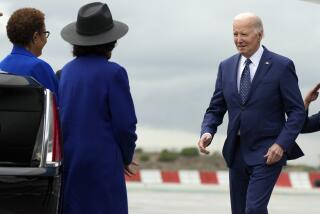Reagan Rules Out New Sanctions on Panama : White House to Cite Non-Cooperation in Battle Against Drugs but Rejects Trade Curbs for Now
WASHINGTON â President Reagan decided Monday to impose no immediate new economic sanctions against Panama, even though he has denounced the regime of Gen. Manuel A. Noriega for deposing Panamaâs civilian president and aiding international drug traffickers, Administration officials said.
The White House is scheduled to announce the decision on Panama today when it releases a report on the role of several countries in efforts to combat drug trafficking.
Officials said that Reagan has decided to declare that Panama is not cooperating with U.S. efforts to fight the drug trade, in view of Noriegaâs indictment last month for allegedly turning his country into a financial base of convenience for cocaine barons of neighboring Colombia.
But after a day of meetings at the White House and the State Department, Reagan decided only to reaffirm those sanctions against Panama that are already in place, not to impose any new measures.
âWe couldnât get our heads together on anything new,â said a senior official who participated in the discussions. âWe may come to it later but there wasnât any general agreement on what will help solve Panamaâs problems.â
Among the possible new sanctions considered were a trade embargo against Panama, stripping Panamanian products of U.S. tariff preferences, imposing a 50% tax on imports from Panama and barring any commercial airline flights between the two countries.
Commerce Secretary William C. Verity Jr. argued strenuously against trade sanctions, saying that they would have little effect unless imposed by several nations, officials said, and State Department officials agreed that there is no need for immediate trade actions.
âWe donât see any real pressure for immediate sanctions,â one official said. âWe may be better off letting things develop in Panama and coming in with sanctions later on.â
Nevertheless, the White House decision appeared likely to touch off at least some criticism in Congress, officials acknowledged.
Senate Minority Leader Bob Dole of Kansas, a candidate for the Republican presidential nomination, called Monday for a U.S. trade embargo against Panama if Noriega fails to step down within 30 days. âThe United States has had enough of Noriega,â he said.
Sen. Edward M. Kennedy (D-Mass.) introduced a resolution asking the Administration to consider imposing economic sanctions, including a full trade embargo. âWhen a drug trafficker gets control over the governmental powers of a nation, itâs a threat to other nations,â he said.
In the action on Panama scheduled for today, the Administration plans to announce measures that already have been applied and will thus have no additional impact.
A 1986 federal anti-drug law requires the President to identify countries that do not take steps to halt drug trafficking to the United States, cut off U.S. aid to them and withdraw American support for their loan requests to international lending institutions. The Presidentâs annual report under the law is due today.
Aid Cut Off Last Year
U.S. economic and military aid to Panama was cut off last year as the dispute over Noriegaâs links to drug traffickers escalated. The United States has also withdrawn its support for multilateral loans to Panama--because the countryâs repayments are badly in arrears, not because of Noriegaâs rule.
Reaganâs report will certify that Mexico is making a good-faith effort to cooperate in drug enforcement efforts, officials said.
For several months, the Reagan Administration has called on Noriega to give up his role as the countryâs political strongman. Since Noriegaâs indictments, his abortive dismissal by Panamanian President Eric A. Delvalle and his decision to depose Delvalle from the presidency, the United States has called on him to resign as well from his military post as commander of the nationâs Defense Forces.
State Department officials said, however, that they have seen no sign that Noriega is planning to step down. âHe appears to think he can still get away with it,â one said.
Department officials said they were pleased with reports that a general strike in Panama, called by the countryâs civilian opposition, had been at least a partial success. But they said they were disappointed that other countries have been slow in announcing their support for Delvalle and their opposition to Noriega.
âHasnât Been Overwhelmingâ
âIt hasnât been overwhelming,â one official noted. âBut itâs sort of been growing.â
Meanwhile, Panamaâs diplomatic missions in Washington and New York attempted to function with two ambassadors and two consuls--one loyal to the deposed Delvalle, the other to Delvalleâs chosen replacement, Manuel Solis Palma.
Delvalleâs ambassador to the United States, Juan B. Sosa, had a brief but heated conversation at the door of his embassy with Solisâ envoy, Leonardo Kam. Sosa later told reporters that he had told Kam to leave the premises.
At the Organization of American States here, Ambassador Ricardo Leyton, who declared his loyalty to Noriega and Solis, was given Panamaâs seat; his former deputy, who declared his loyalty to Delvalle, was seated in the audience.
More to Read
Sign up for Essential California
The most important California stories and recommendations in your inbox every morning.
You may occasionally receive promotional content from the Los Angeles Times.











